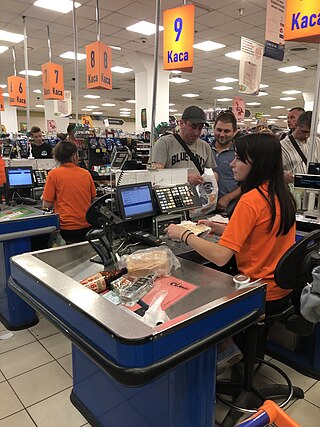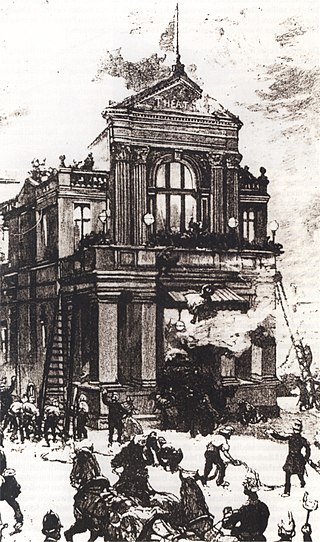In aviation, visual flight rules (VFR) are a set of regulations under which a pilot operates an aircraft in weather conditions generally clear enough to allow the pilot to see where the aircraft is going. Specifically, the weather must be better than basic VFR weather minima, i.e., in visual meteorological conditions (VMC), as specified in the rules of the relevant aviation authority. The pilot must be able to operate the aircraft with visual reference to the ground, and by visually avoiding obstructions and other aircraft.
The Federal Aviation Regulations (FARs) are rules prescribed by the Federal Aviation Administration (FAA) governing all aviation activities in the United States. The FARs comprise Title 14 of the Code of Federal Regulations. A wide variety of activities are regulated, such as aircraft design and maintenance, typical airline flights, pilot training activities, hot-air ballooning, lighter-than-air aircraft, human-made structure heights, obstruction lighting and marking, model rocket launches, commercial space operations, model aircraft operations, unmanned aircraft systems (UAS) and kite flying. The rules are designed to promote safe aviation, protecting pilots, flight attendants, passengers and the general public from unnecessary risk.

School prayer, in the context of religious liberty, is state-sanctioned or mandatory prayer by students in public schools. Depending on the country and the type of school, state-sponsored prayer may be required, permitted, or prohibited. The United Kingdom requires daily worship by law, but does not enforce it. Countries which prohibit or limit school prayer often differ in their reasons for doing so. In the United States, school prayer cannot be required of students in accordance with the Establishment Clause of the First Amendment to the United States Constitution. This is generally rigorously applied in public schools; the Establishment Clause does not prevent prayer in private schools that have no public funding. In Canada, school-sponsored prayer is disallowed under the concept of freedom of conscience as outlined in the Canadian Charter on Rights & Fundamental Freedoms. School-sponsored prayer is disallowed in France as a byproduct of its status as a secular nation.

An aisle is a linear space for walking with rows of non-walking spaces on both sides. Aisles with seating on both sides can be seen in airplanes, in buildings such as churches, cathedrals, synagogues, meeting halls, parliaments, courtrooms, theatres, and in long passenger vehicles. An aisle floor may be level or, as in theatres, sloping upward from a stage.

The Curtain Theatre was an Elizabethan playhouse located in Hewett Street, Shoreditch, just outside the City of London. It opened in 1577, and continued staging plays until 1624.

A safety curtain is a passive fire protection feature used in large proscenium theatres. It is usually a heavy fabric curtain located immediately behind the proscenium arch. Asbestos-based materials were originally used to manufacture the curtain, before the dangers of asbestos were widely known. The safety curtain is sometimes referred to as an iron curtain in British theatres, regardless of the actual construction material.
Process Safety Managementof Highly Hazardous Chemicals is a regulation promulgated by the U.S. Occupational Safety and Health Administration (OSHA). It defines and regulates a process safety management (PSM) program for plants using, storing, manufacturing, handling or carrying out on-site movement of hazardous materials above defined amount thresholds. Companies affected by the regulation usually build a compliant process safety management system and integrate it in their safety management system. Non-U.S. companies frequently choose on a voluntary basis to use the OSHA scheme in their business.
The Canada Labour Code is an Act of the Parliament of Canada to consolidate certain statutes respecting labour. The objective of the Code is to facilitate production by controlling strikes & lockouts, occupational safety and health, and some employment standards.

Shakespeare's Globe is a reconstruction of the Globe Theatre, an Elizabethan playhouse first built in 1599 for which William Shakespeare wrote his plays. Like the original, it is located on the south bank of the River Thames, in Southwark, London. The reconstruction was completed in 1997 and while concentrating on Shakespeare's work also hosts a variety of other theatrical productions. Part of the Globe's complex also hosts the Sam Wanamaker Playhouse for smaller, indoor productions, in a setting which also recalls the period.

Seating capacity is the number of people who can be seated in a specific space, in terms of both the physical space available, and limitations set by law. Seating capacity can be used in the description of anything ranging from an automobile that seats two to a stadium that seats hundreds of thousands of people. The largest sporting venue in the world, the Indianapolis Motor Speedway, has a permanent seating capacity for more than 235,000 people and infield seating that raises capacity to an approximate 400,000.

The Convention on Road Traffic, commonly known as the Vienna Convention on Road Traffic, is an international treaty designed to facilitate international road traffic and to increase road safety by establishing standard traffic rules among the contracting parties. The convention was agreed upon at the United Nations Economic and Social Council's Conference on Road Traffic and concluded in Vienna on 8 November 1968. This conference also produced the Convention on Road Signs and Signals. The convention had amendments on 3 September 1993 and 28 March 2006. There is a European Agreement supplementing the Convention on Road Traffic (1968), which was concluded in Geneva on 1 May 1971.

Building regulations in the United Kingdom are statutory instruments or statutory regulations that seek to ensure that the policies set out in the relevant legislation are carried out. Building regulations approval is required for most building work in the UK.

At the Drop of a Hat is a musical revue by Flanders and Swann, described by them as "an after-dinner farrago". In the show, they both sang on a nearly bare stage, accompanied by Swann on the piano. The songs were linked by contemporary social commentary, mostly by Flanders. After a long London run the show played in the US, Switzerland, and on tour in Britain.

The Theatres Act 1843 is a defunct Act of Parliament in the United Kingdom. It amended the regime established under the Licensing Act 1737 for the licensing of the theatre in Great Britain, implementing the proposals made by a select committee of the House of Commons in 1832.
Fresh Airs was a revue produced by Laurier Lister that opened in Brighton in 1955. It was the last in his series of "Airs" revues before Flanders & Swann started performing for themselves in At the Drop of a Hat.
The Massachusetts Executive Office of Public Safety and Security is a Commonwealth of Massachusetts organization whose focus is the protection of individuals, groups or environment issues which will, subsequently, affect individuals or groups health or well being. As an executive agency, the Office is managed by a Commissioner who is appointed by the Governor.

The Hazardous Materials Transportation Act (HMTA), enacted in 1975, is the principal federal law in the United States regulating the transportation of hazardous materials. Its purpose is to "protect against the risks to life, property, and the environment that are inherent in the transportation of hazardous material in intrastate, interstate, and foreign commerce" under the authority of the United States Secretary of Transportation.

The right to sit refers to laws or policies granting workers the right to be granted suitable seating at the workplace. Jurisdictions that have enshrined "right to sit" laws or policies include Austria, Japan, Germany, Mexico, France, Spain, Argentina, the United Kingdom, Jamaica, South Africa, Eswatini, Cameroon, Tanzania, Uganda, Lesotho, Malaysia, Brazil, Israel, Ireland, Zambia, Guyana, the Indian states of Tamil Nadu and Kerala, and the British overseas territories of Gibraltar and Montserrat. Almost all states of the United States and Australia, as well as the majority of Canadian provinces, passed right to sit legislation for women workers between 1881 and 1917. US states with current right to sit legislation include California, Florida, Massachusetts, Montana, New Jersey, New York, Oregon, Pennsylvania, West Virginia, and Wisconsin.
The right to sit in the United States refers to state and local laws and regulations guaranteeing workers the right to sit at work when standing is not necessary. The right to sit was a pillar of the early labor movement. Between 1881 and 1917, almost all states, the District of Columbia, and Puerto Rico had passed legislation concerning suitable seating for workers. These laws were enacted during the Progressive Era, spearheaded by women workers in the labor movement.

On 5 September 1887, a fire broke out in the backstage area of the Theatre Royal in Exeter, England, during the production of The Romany Rye. The fire caused panic throughout the theatre, with 186 people dying from a combination of the direct effects of smoke and flame, crushing and trampling, and trauma injuries from falling or jumping from the roof and balconies.












